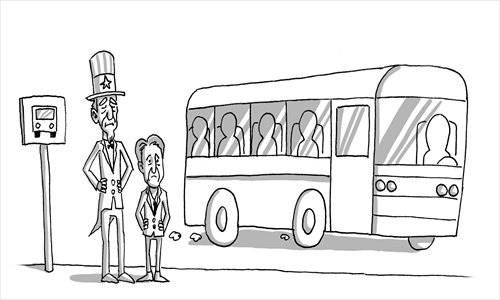HOME >> OP-ED
US-Japan alliance risks being left behind in new Asian order
By Ding Gang Source:Global Times Published: 2015-4-29 20:23:01

Illustration: Liu Rui/GT
Japanese Prime Minister Shinzo Abe is afforded a chance to deliver a speech to the US Congress Wednesday, unprecedented even for Japan's top leader, a fact which makes a number of Japanese very proud.
Japan's former defense minister Yuriko Koike recently wrote, "The Japan-US alliance is now 63 years old, but this will be the first time that a Japanese leader will be accorded this high honor from the American government and people."
Due to a lack of political trust, despite the fact that Japan has been deemed the US's most important ally in Asia for a long time, Washington has never given such special privilege to Tokyo before.
Thus, does Abe being afforded this opportunity mean Japan has gained the US's more trust?
The answer is yes. Compared to the Americans' fear that the rising Japan would overtake the US during the 1960s, Washington is indeed feeling more at ease with Tokyo.
Japanese economic, technological, military strength, and its influence in Asia have bolstered the US-Japan military alliance, and helped cut down on US burdens. All of this plays its part.
More importantly, after witnessing the emergence of China, Washington needs a power in Asia to balance Beijing, and only Japan can help it achieve this goal.
Therefore, the US has taken a strategic decision to provide Japan with support, including allowing Japanese forces to play a more offensive role in global military operations, and expanding the scale and the scope of US-Japanese military alliance from regional to global.
Thus, instead of saying that the US finds Japan more trustworthy, it is in fact Washington that needs Tokyo more than ever, not vice versa.
Though there are quite a few Americans who do not believe Japan could wholeheartedly follow the orders of the US, putting Japan in this position is in line with Washington's strategic interests. This was a strategic choice to balance China, and the goal from the very beginning was strengthening the military alliance. But since every military alliance is against a third party, this alliance will bring Asia bigger risks, rather than a real chance for peace.
It could be expected that military cooperation between the US and Japan could become more focused on containing the rise of China.
The more comprehensive their collaboration is, the stronger backlash it will trigger from China, leaving Asia in jeopardy.
Another hazard involved in the US-Japanese cooperation comes from the fact that Tokyo has never sincerely reflected on its militarism, nor has it faced up to its wartime history. Consequently, military cooperation between it and the US on such basis could raise concerns from the countries who were Japan's victims during WWII.
US trust toward Japan is vulnerable, for it is based on military cooperation increasingly aimed at China. And Washington will eventually pay for that. Asia is building a new order, with China as a key new player. Undoubtedly, China has emerged as a global power within Asia's existing order; there will be a place for Beijing in the construction of a future order.
Given the close economic and trade interactions within Asian nations, and the positive dynamics brought about by the rise of China, this new order is now giving further space for more emerging countries. And such space should be provided at the negotiating table, not in military confrontations.
Asia is building a new framework. Can it be a sturdy one without China's participation?
If the US and Japan want to establish such a framework to constrain China behind closed doors, it will only squeeze the space for cooperation. All China can do in response is set up a new one.
The author is a senior editor with People's Daily. He is now stationed in Brazil. dinggang@globaltimes.com.cn. Follow him on Twitter at @dinggangchina